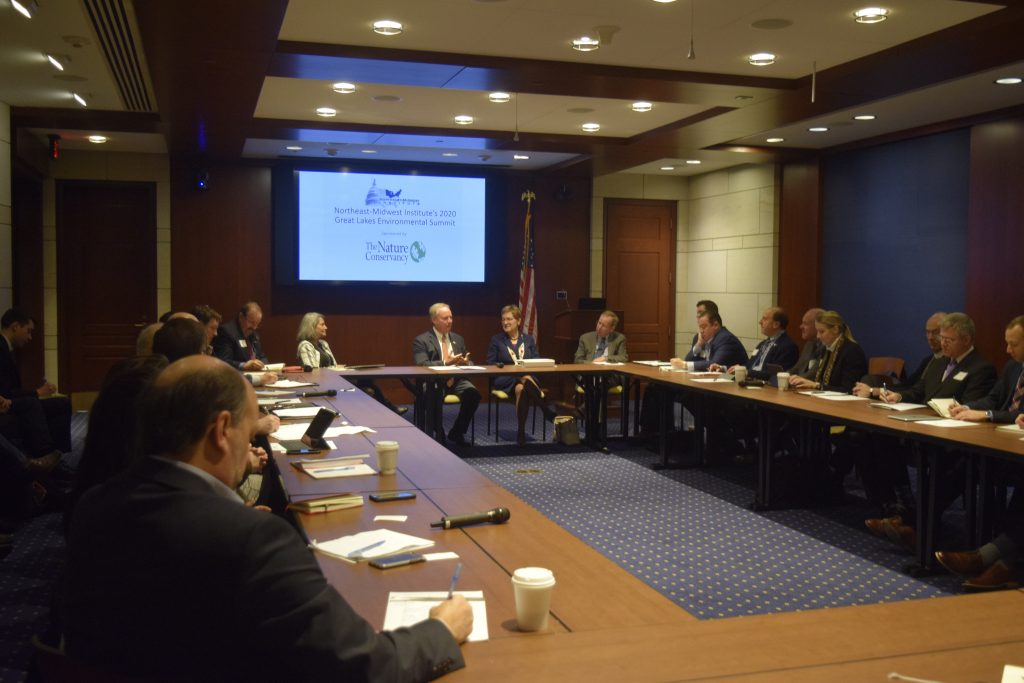Sponsored This Year by The Nature Conservancy

February 5th, 2020 – The Northeast-Midwest Institute (NEMWI) held its annual Great Lakes Environmental Summit in the U.S. Capitol’s Visitors Center. The Summit serves as a convening of Great Lakes policy experts, advocates, and stakeholders to discuss the issues that are most impactful to the health of the Great Lakes. This year, NEMWI was honored to have The Nature Conservancy serve as the Summit’s major sponsor. With more than one million members, The Nature Conservancy serves as one of the most effective and wide-reaching environmental organizations in the world. For over 65 years, The Nature Conservancy has worked to protect the world’s largest system of freshwater by helping protect more than 100 sites throughout the Great Lakes, including prairies, savannas, forests, wetlands and rivers, as well as working collaboratively with farmers, foresters, elected officials, agencies, and communities across the region to protect this globally significant freshwater ecosystem.
Presenters at this year’s Summit, which included Members of Congress, Congressional staff, and Administrative officials, discussed the 2020 federal policy agenda in Washington, D.C., as it pertains to the Great Lakes. The Summit continues to be a major D.C.-based event providing Great Lakes organizations the opportunity to hear directly from federal decision-makers about the legislative opportunities during the upcoming year that could positively impact the Great Lakes.
Kicking of the Summit, the Northeast-Midwest Institute’s President, Dr. Michael Goff, provided welcoming remarks, thanking The Nature Conservancy for its sponsorship, and also recognizing the C.S. Mott Foundation, the Joyce Foundation, and the Erb Family Foundation for their support of the Great Lakes Washington Program and the Summit. He also introduced Ms. Madhu Anderson, the new Director of Government Relations at The Nature Conservancy’s Michigan chapter. Ms. Anderson addressed The Nature Conservancy’s dedication to promoting projects and policies that help restore and protect the Great Lakes.
Co-Chairs of the bipartisan Congressional Great Lakes Task Force, Representatives Marcy Kaptur (D-OH), Bill Huizenga (R-MI), and David Joyce (R-OH), all provided remarks about the key work that the Congressional delegation is achieving on critical Great Lakes policy areas in Washington, D.C., including increasing funding for the Great Lakes Restoration Initiative (GLRI), increased resources to combat aquatic invasive species like Asian carp, and improved water infrastructure throughout the region. In addition to the three Co-Chairs, Rep. Dan Kildee (D-MI), who serves on the Great Lakes Task Force, and is also a Co-Chair of the bipartisan Congressional Task Force on PFAS, provided an update on current Congressional actions aimed at addressing emerging PFAS threats in the Great Lakes region.
In addition to hearing directly from Members of Congress, the Summit also provided the opportunity to learn about the legislative agenda directly from Congressional Committee staff. Staffers from the House and Senate Appropriations Committees, the Senate Agriculture Committee, the Senate Environment and Public Works Committee, and the House Transportation and Infrastructure Committee provided insights on issues ranging from the FY 2020 omnibus appropriations package to the implementation of the 2018 Farm Bill to the upcoming Water Resource Development Act (WRDA) authorization bill.
Mr. Jimmy Bramblett, Deputy Chief for Programs (Conservation Planning and Program Delivery) at the Natural Resources Conservation Service (NRCS) within the U.S. Department of Agriculture, provided an update on the Regional Conservation Partnership Program (RCPP), one of the key federal conservation programs aimed at reducing nutrient runoff into the nation’s great bodies of water. Mr. Bramblett provided a detailed overview of the RCPP, while fielding questions from the audience. Additionally, Mr. Chris Askew-Merwin, Senior Policy Analyst at NEWMI, discussed a new Great Lakes Water Affordability Research and Policy Initiative at NEMWI that will aim to explore solutions to the continued high costs of water delivery throughout the Great Lakes region.